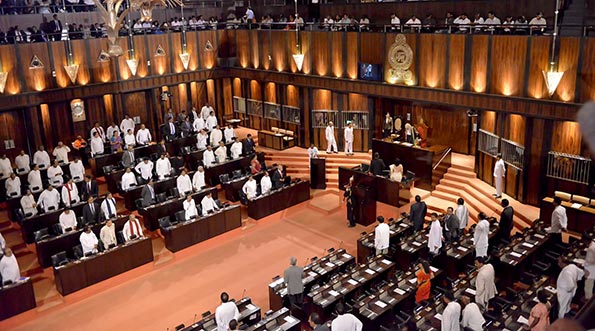Lanka's Constitutional Proposals Reveal Concern Over Threat Of Secession
P.K. BALACHANDRAN
COLOMBO: An outline of Sri Lanka’s new constitution reveals an entrenched fear of separatism and secession.
The Interim Report of the Steering Committee of the Constitutional Assembly which was submitted on Thursday, suggested stringent constitutional provisions to stem separatism.
This, despite the fact that Sri Lanka had crushed a long standing armed separatist movement with overwhelming military might eight years ago.
The Steering Committee of Sri Lanka’s “Constitutional Assembly” presented its Interim Report to parliament, which, apart from being the country’ legislature, also functions as the “Constitutional Assembly” charged with the responsibility of drafting a new constitution for Sri Lanka.
The Steering Committee consists of the leaders of all political parties represented in parliament and is chaired by Prime Minister Ranil Wickremesinghe.
The Interim Report is not a prescriptive document, but a rough draft of the issues to be addressed by the Constitutional Assembly. It mentions matters on which there has been consensus as well as those which had elicited conflicting views.
The Tamil National Alliance (TNA) had campaigned hard to give the country a “federal” constitution with a wide measure of inalienable autonomy to the provinces within an “undivided and indivisible Sri Lanka”. But the mainstream Sri Lankan parties, including the two in the government – Sri Lanka Freedom Party (SLFP and the United National Party (UNP) – opposed a federal structure tooth and nail.
As per the compromise arrived at finally, Sri Lanka is to be an “undivided and indivisible country” with “maximum devolution of power to the provinces.”
But to strengthen unity and territorial integrity, the Interim Report further said that there should be special provisions to prevent secession.
Since all political parties representing the majority Buddhist community wanted no change in the “foremost” status given to Buddhism, the provision relating to it in the present constitution has been retained, along with the guarantee that other religions “will be treated with honor and dignity without discrimination.”
The TNA demanded a secular state but finally gave in to the majority opinion that Buddhism should be given the foremost place.
The extremist nationalist party, Jathika Hela Urumaya (JHU), opposed devolution of power to the provinces and wanted power to be devolved to the smaller, grassroots level “local bodies”.But other parties approved the proposal to keep the “province” as the unit of devolution. Sri Lanka is divided into nine provinces.
The SLFP said that devolution should be as per the existing 13 th.Amendment which came into being following the India-Sri Lanka Accord of July 29, 1987.
Since the Tamil minority has been wanting to re-unite the Northern and Eastern provinces to form a single Tamil-speaking “Tamil Homeland” the Interim Report allows merger of two provinces if that is approved in a referendum in the two provinces concerned.
But in a dissenting note, the Joint Opposition led by former President Mahinda Rajapaksa opposed the proposal to allow provinces to merge feaing Tamil consolidation.
The Interim Report suggests the abolition of the Concurrent List in the division of power between the Center and the Provinces. It was felt that the Concurrent List enables the Center to abridge the powers of the provinces assigned under the Provincial List.
The report however suggested that the Center should be able to formulate national policies even on matters in the Provincial List, though in consultation with the Provincial Councils.
President Maithripala Sirisena’s SLFP had suggested that there should be at least a small and well defined Concurrent List to enforce national policies and imperatives.
Vis-à-vis powers over land and police, the Interim Report has suggested the retention of the devolution principles contained in the existing 13 th Amendment. But the Sinhala nationalist JHU charged that the Interim Report has given the provinces all power over land to the detriment of the Center jeopardizing national security.
Again on security grounds the JHU opposed the creation of a Provincial Police Force and a Provincial Police Commission distinct from the National police and the National Police Commission.
The Interim Report has been equivocal on the abolition of the Executive Presidency. It stated various views which will have to be considered by the Constitutional Council.
But it suggested a Second Chamber in parliament which will be elected mostly by the Provincial Councils. The second chamber is meant to give the provinces a say in the affairs of the nation as whole. While other parties were supportive, the JHU considered the Second Chamber to be wasteful.
There were differing views on the powers of the Governor. While the Sinhala majority parties wanted the Governor to be as strong as he or she is now, the moderates wanted the Governor to go by the advice of the Provincial Board of Ministers except in some special circumstances.
But there was consensus that the demarcation of his powers between the Governor and the Provincial Council should be clear and unambiguous.
The Joint Opposition led by former President Rajapaksa said in its note there is no need to change the present “unitary” constitution and that the Interim Report clearly indicates a plan to turn the country into a de facto federal state.





